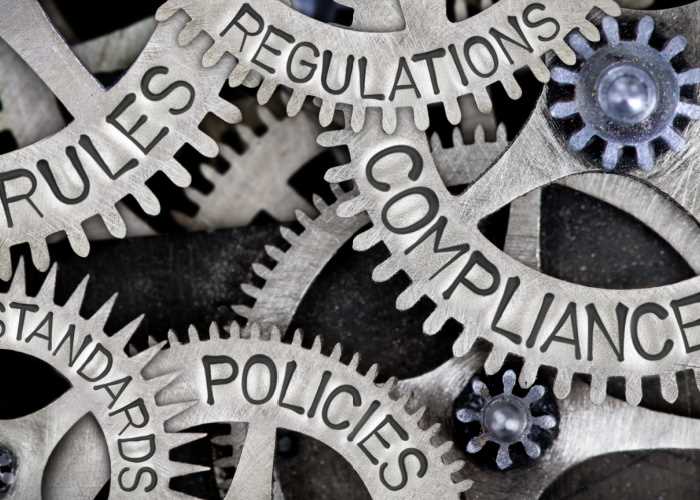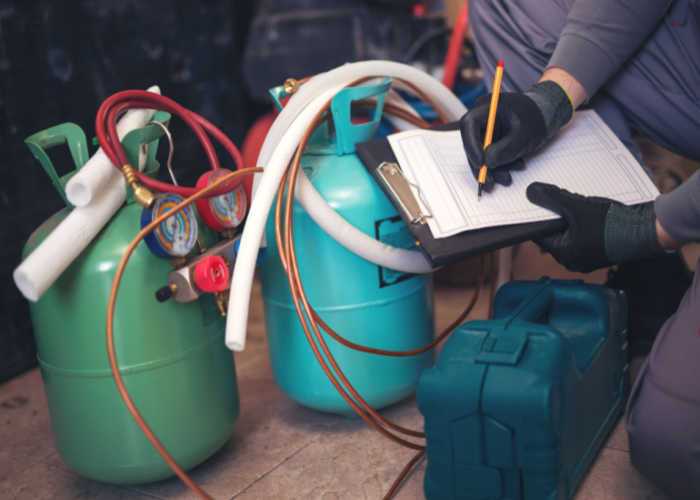Commonly used in refrigeration, air conditioning and heat pump systems, F-Gases include various synthetic gases like hydrofluorocarbons (HFCs) and perfluorocarbons (PFCs) - the use of which is governed by the F-Gas Regulations.
For business owners and facilities managers, it's important to ensure that any work carried out on stationary HVAC equipment is completed by an F-Gas certified professional.
But before we look at why, let’s explore the F-Gas Regulations themselves.

The purpose of F-Gas Regulations is to reduce the emissions and usage of F-Gases, which have high global warming potential (GWP) and contribute to climate change.
F-Gas Regulations were first introduced by the European Union in 2006, but since leaving the EU the UK has maintained its commitment to the correct control and reduction in the use of F-gases under The Ozone-Depleting Substances and Fluorinated Greenhouse Gases (Amendment etc.) (EU Exit) Regulations 2019.
This simply implements all of the main pillars of the EU F-Gas Regulation under UK legislation.
The key objectives of F-Gas Regulations are:
F-Gas certification refers to the process through which individuals and companies are trained and accredited to handle and work with F-Gases in compliance with regulations.
Certification ensures that individuals have the knowledge and skills to handle F-Gases safely, minimise leaks, recover and recycle the gases, and follow proper disposal procedures.
Here's an overview of how F-Gas certification works:
Training: individuals seeking F-Gas certification undergo specific training that covers the regulations, safety procedures, handling techniques, leak detection, equipment servicing, recovery, and disposal of F-Gases.
Examination: after completing the training, individuals need to pass an examination that assesses their understanding of F-Gas regulations, best practices, and practical skills related to handling F-Gases.
Renewal: F-Gas certifications are valid for a certain period, after which individuals need to undergo refresher training or pass recertification exams to ensure their knowledge is up to date.
Company certification: in addition to individual certification, companies or contractors that work with F-Gases must also obtain company certifications or accreditations. These certifications demonstrate that the company has a trained and knowledgeable workforce to handle F-Gas-related tasks.
There are multiple reasons why it’s imperative for businesses to work with F-Gas certified contractors:

Legal Compliance:
Environmental Responsibility:
Safe Handling and Maintenance:
System Efficiency and Performance:
Expertise and Training:
Comprehensive Services:
Documentation and Reporting:
Avoiding Penalties:
Here are the key certifications to consider when evaluating HVAC contractors:
REFCOM Certification: REFCOM is a well known UK certification scheme for refrigerant handling. Contractors registered with REFCOM have demonstrated their commitment to F-Gas compliance.
REFCOM Elite Certification: this is an advanced level of REFCOM certification, showcasing higher competence and commitment to best practices.
ACRIB SKILLCard: this card verifies an individual engineer’s competence, skills, and qualifications in the air conditioning and refrigeration industry.
SafeContractor or CHAS Certification: While not specific to F-Gas, these certifications indicate a contractor's commitment to health and safety standards.
Choosing a contractor with the right certifications gives you peace of mind that they’re knowledgeable and fully trained in the correct handling of F-Gases , ensuring safety, environmental responsibility and legal compliance.
